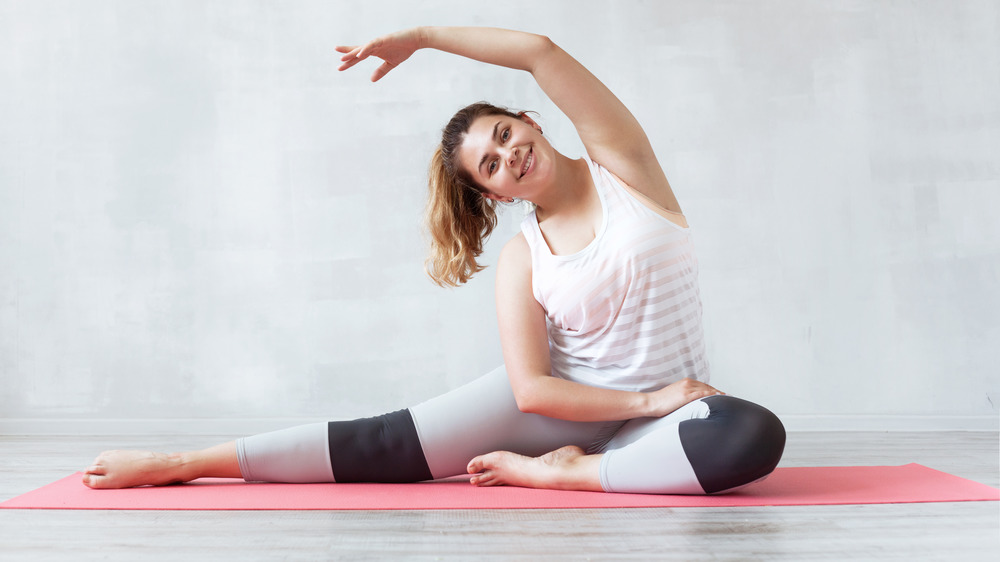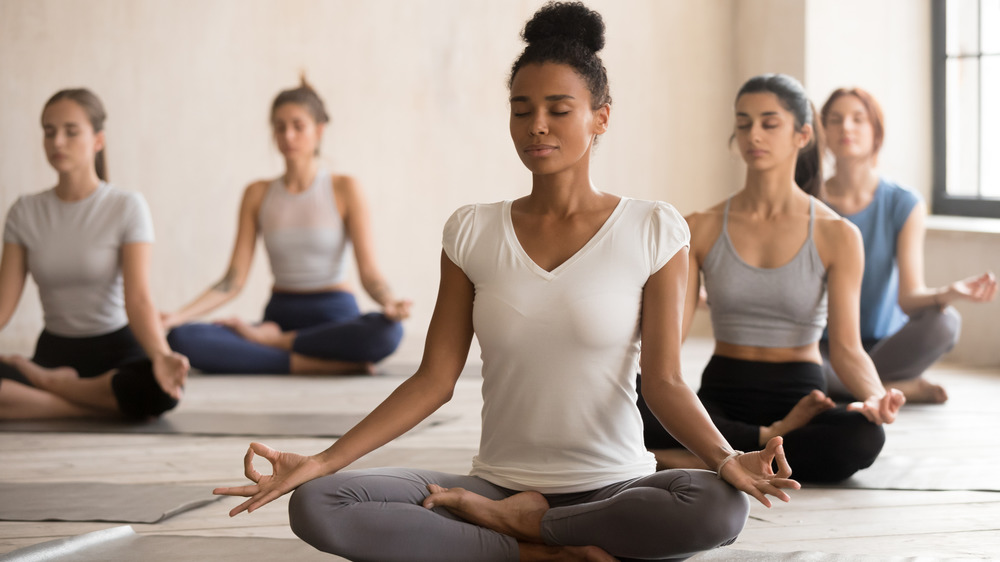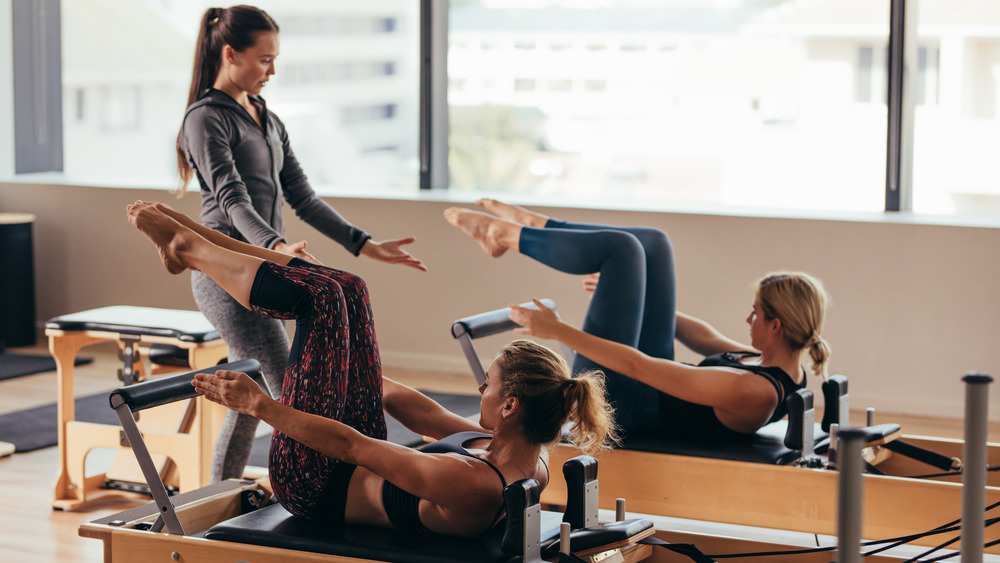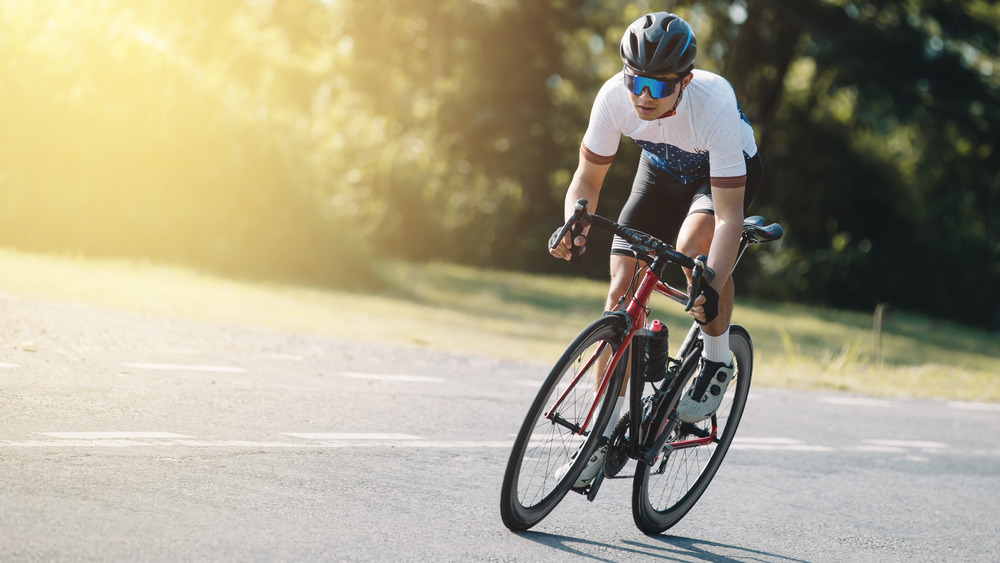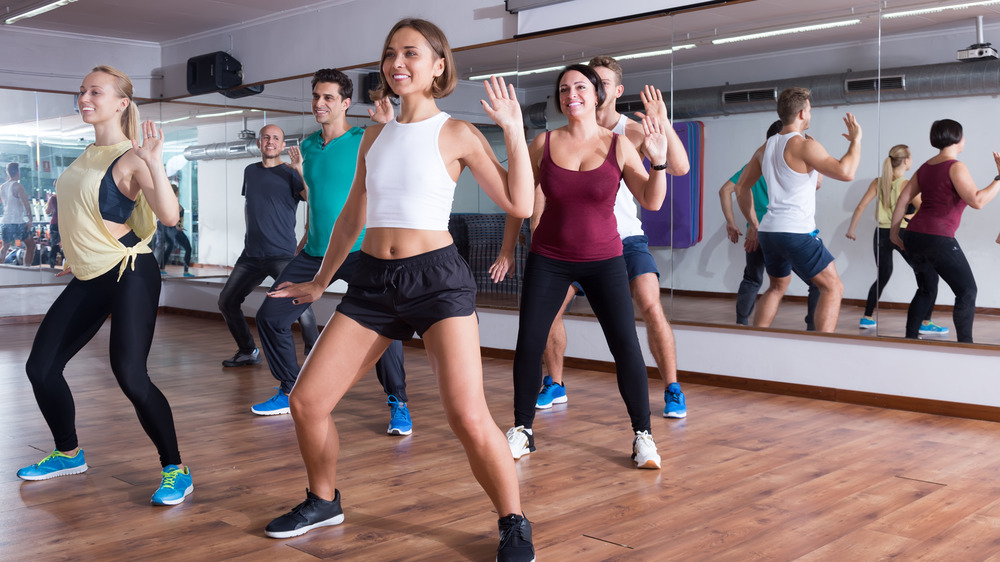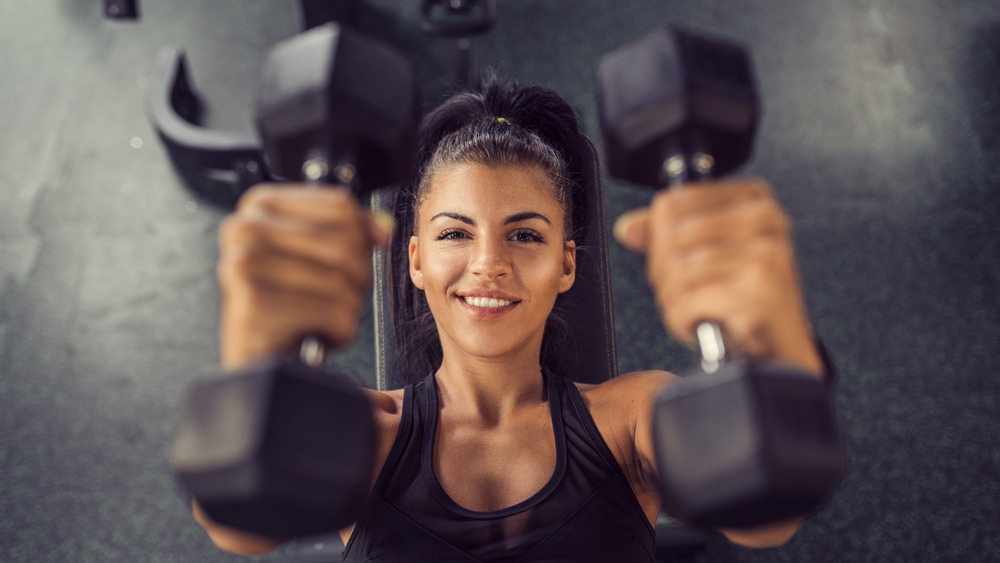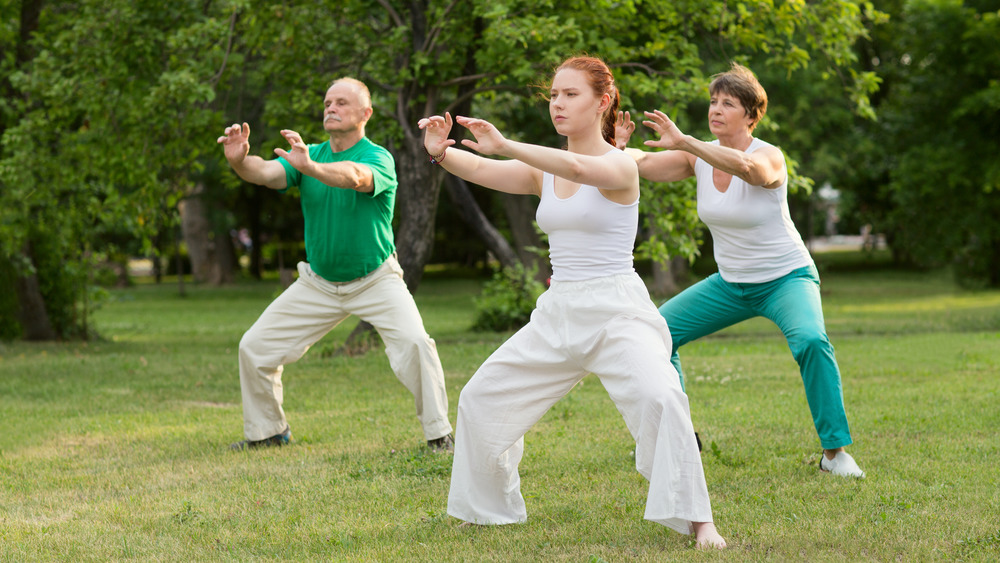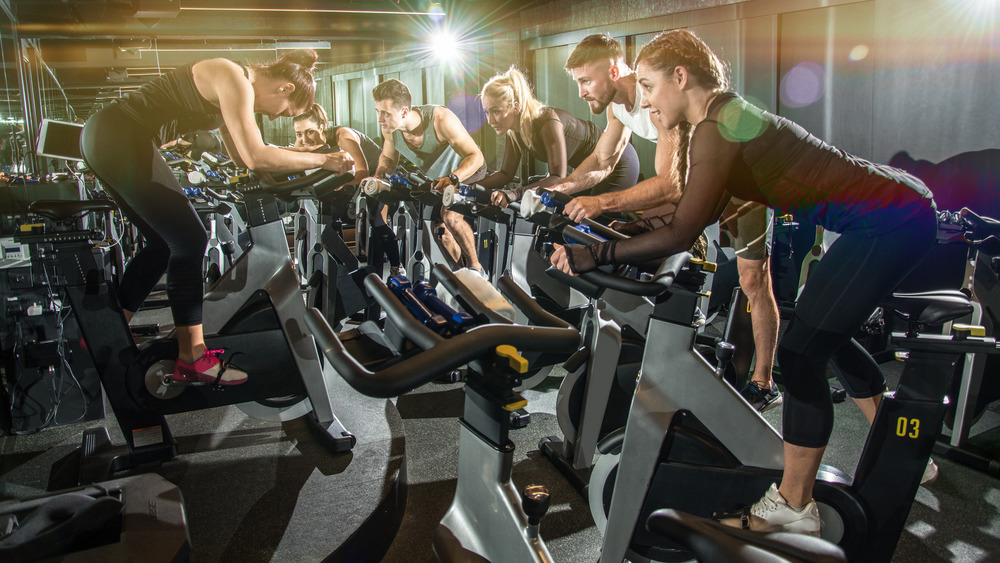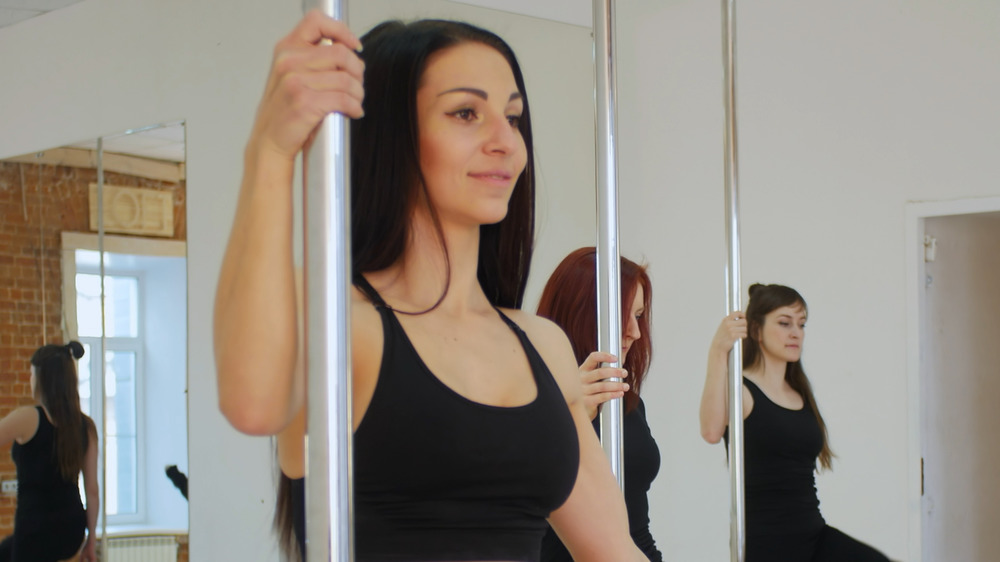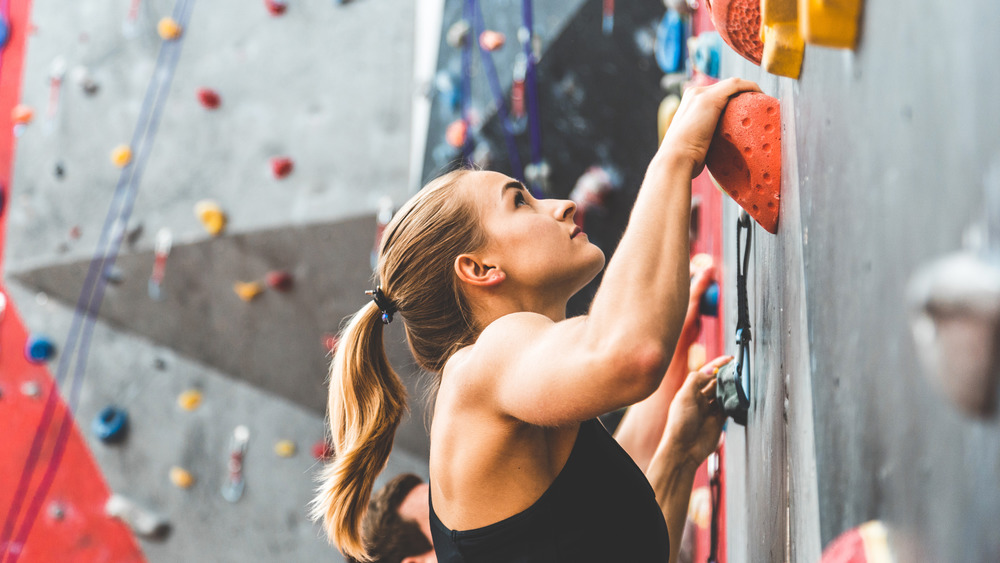Exercises That Will Put You In A Better Mood
You may plan to exercise daily, but the motivation can be lacking when it comes times to hit the gym or start your at-home workout. This is especially true if you find yourself in a funk and just want to veg out and binge watch some more TV. We have all been there, done that. But the reality is: When you do muster up the physical and mental energy to get your fitness on, you end up feeling way better and more self satisfied. And while most forms of physical activity can result in a healthy, happy endorphin boost, there are a few specific types of exercise that can be especially helpful in improving your mood and enhancing your state of mind.
Whether you want to feel less stressed and more zen, desire that post-cardio high, or are looking for some companionship or socialization, there's a workout for you. The options are plentiful and the individualized benefits are too. Want to know what routines will help transform you mood most effectively? Put on your workout gear (we're amping to get you pumped!) and read on.
Yoga will settle you down and zen you out
Feeling frenzied? If you're perpetually being pulled in a million different directions and this messy state of mind is wearing on your mood, it may be time to welcome yoga into your life.
A study published by the Journal of Alternative and Complementary Medicine found that those who incorporate a regular yoga practice into their routine see a marked difference in mood versus people who choose a different form of exercise, like walking. After 12 weeks, participants who were tasked with doing yoga had higher levels of gamma-aminobutyric acid (GABA) in their brains. And more GABA activity is a good thing! People with depression or other mental disorders often have low levels of the acid. Although yoga is not a substitute for antidepressants, it can be a great form of exercise for all bodies and minds. It's particularly promising in helping to treat depression, as noted by Dr. Kim A. Jobst, the journal's editor-in-chief (via Science Daily).
Whether you're an inflexible newbie or an experienced yogi, you can experiment with any of the 11 major types of yoga and learn new yoga poses to suit your needs, accommodate your body, and quiet the chaos in your mind.
Pilates can strengthen your mood
Pilates is a type of exercise that works to "strengthen muscles while improving postural alignment and flexibility," as explained by Self. Sonja Herbert, Pilates instructor and founder of Black Girl Pilates, told the magazine that whether performed on a mat or at a machine, the basic premise of a Pilates practice is to build up and "stabilize your core body," which in turn can help you with all sorts of other activities and exercises.
While Pilates will help you get enviable abs, it can also give you a major attitude adjustment — in a good way. A meta-analysis published in Complementary Therapies in Medicine found that Pilates can be an effective tool in mental health maintenance. Furthermore, a study in the Journal of Bodywork and Movement Therapies noted that Pilates can help improve one's mood and sleep quality.
If exhaustion is further fueling frustration and worsening your overall mood, try a beginners' Pilates class. You can strengthen your body, embrace life and levity, and snooze more comfortably in one fell swoop (or, you know, crunch).
Running can race those blues away
There is a reason it's called a "runner's high." Those who lace up and hit the pavement can attribute this overwhelming post-run positivity to the release of endorphins that happen after a cardio session, as noted by UPMC's HealthBeat. These hormones reduce stress and anxiety, and can even dull some degree of physical pain.
Dr. David Linden, a neuroscience professor, revealed in an article for Johns Hopkins Medicine that it's also likely endocannabinoids at work. "Unlike endorphins," Linden continued, "endocannabinoids can move easily through the cellular barrier separating the bloodstream from the brain, where these mood-improving neuromodulators promote short-term psychoactive effects such as reduced anxiety and feelings of calm."
Beyond this short-lived feeling of empowerment, running can lead to more longterm happiness, as pointed out by HealthBeat. Setting goals for running a certain distance (maybe even a marathon!) can result in a huge confidence boost and a major sense of achievement. What's more, running in the great outdoors might give you the dose of Vitamin D your body needs, according to Harvard Health.
Walking can help you work things out
If speed isn't your thing, don't worry. While running is a great cardio option, plain old low-impact walking has health and mental benefits, too. The research speaks for itself. A 2005 study found that going for a nature stroll can help reduce rumination, which is a symptom of both depression and anxiety.
Another study noted that older adults who engage in regular walking exhibit better mental acuity and have stronger cognition. As the study revealed, their hippocampi actually increased in size, which helped to improve their memories. And, finally, research has also shown that college students who embrace light exercise (like walking) report lower levels of stress.
But, honestly, you probably don't need to read jargony studies to grasp the benefits of walking. Scientific findings aside, the anecdotal positive effects of going somewhere scenic and taking a walk are plentiful — and kind of obvious. You can go it alone or pair up with your partner, pup, or friends to give your brain a mental break from life's obligations and "get out of your head." Sometimes going for a walk can help you put problems into perspective and allow you to think outside the box. All of these things add up a healthier, happier you (via Verywell Fit).
Swimming will clear your head
Feeling like a fish out of water? If you are down in the dumps or out of sorts, one of the best ways to snap out of the funk is to jump into a pool. A study published in Perceptual and Motor Skills found that swimming as part of your regular exercise routine can reduce confusion, tension, and depression. What's more, an article in the Journal of Rehabilitation Medicine found that women with fibromyalgia (a condition characterized by musculoskeletal pain and accentuated by exhaustion and mood issues) reported a reduction in anxiety and depression after eight months of aquatic therapy.
Neuropsychologist David Coppel told Medical Daily that free swimming or doing laps can help to reduce depression and anxiety as the techniques employed are somewhat "meditative." In other words, you might be able to drown out the chaos happening in your head with some repetitive swim strokes and breathing techniques.
Boxing can knock out a bad mood
Got some pent up frustration? Feeling angry or over it or just stuck, mentally? It's time to hit it out. It'll feel good to knock the wind out of a punching bag — go ahead and picture your frenemy's mug, we won't tell.
Boxing coach Tanya Morgan told Harper's Bazaar that boxing forces a person to "fully concentrate on the task at hand." She elaborated, saying, "To box well, you need to be able to switch off from the outside world and be 100% focused. Boxing is fast, furious and above all fun, leaving little room in your head for anything else." According to Morgan, it also gives you "a fresh perspective to better deal with problems."
Boxing will also help you to not only get stronger, but feel stronger too. This will "give you the fighting spirit to enable you to deal with any of life's more challenging situations," the uppercut pro explained. Yes, boxing is a great way to blow off steam and help you feel more empowered.
Something grinding your gears? Hop on your bicycle
There's a plethora of evidence supporting cycling's mental health benefits. Research published in BioPsycho Social Medicine found that individuals being treated for depression had reduced levels of cortisol — the stress hormone — after cycling for just 15 minutes. Another study found that healthy men who cycled for a half-hour, experienced improvements in "some aspects of cognition, most prominently for memory, reasoning and planning."
What's more, a paper published in Environmental Science and Technology chronicled an experiment in which participants rode a bike for a few minutes while looking at videos of nature. (Yes, they were cycling indoors while admiring images of the great outdoors.) When the video was balanced with the color green, the cyclists had "lower total mood disturbance and ratings of perceived exertion." This supports the idea that exercise can be even more beneficial when set in a green alfresco environment. That, of course, makes sense since being outside in nature — even without the added element of physical activity — can positively alter one's state of mind.
Dancing can help melt your worries away
Feeling stressed? Be like Taylor Swift and "shake it off." Literally. Dancing as a form of exercise can help you shed pounds and worries. Jonathan Tylicki, a professional dancer and the director of education for a boutique fitness company called AKT, explained to Healthline that "movement and dance are extremely expressive," which allows a person "to escape and let loose."
Don't know what kind of dance to try? Get your booty to a Zumba class. You can find this Latin dance-inspired group class at your local YMCA, a small studio, or even online. Zumba is a popular option for good reason: The music, the moves, and the palpable energy make it fun while the repetitive choreography makes it approachable for beginners (via Verywell Fit).
A study published in Human Kinetics Journals found that women who in participated in an eight-week Zumba exercise regimen reported higher levels of fitness and enhanced physical strength. What's more, they felt "greater autonomy" and "purpose in life."
Lifting weights can lift your mood
Most studies that seek to measure the mental benefits of exercise focus on cardio — with results pointing to a positive correlation between aerobic activity and mood. But what about lifting weights? Can hauling a barbell help make you feel happier, too?
An analysis of multiple studies published in JAMA Psychiatry found that resistance training had a significant effect in reducing depressive symptoms. The researchers found that mood improvement was a fairly universal benefit regardless of how effective the physical form of exercise was for individuals. In other words, even if your muscles don't change, your mood most likely will.
The lead researcher, Jacob Meyer, told The Washington Post that he partially attributed this post-workout positivity to "the sense of accomplishment and confidence that comes from exercising, rather than the achievement of actual strength gains." But he also believes there is a physical factor at play. "If the physiological adaptations associated with strength gains and muscle growth interact with the neurobiology of depression, then it may have different (and greater) effects on depression than aerobic training alone," he continued.
Team sports are good for the heart and mind
Want to get some exercise and feel a sense of camaraderie? Join a team sport — it's a win-win (even if you lose). A study published in the Journal of Sports Science and Medicine found that young athletes who play a team sport have more fun than those who take part in a more individualized physical activity. This is a good reason to try soccer, basketball, softball, or other collaborative sports. Furthermore, the research found that solo sports players are more prone to anxiety and depression and tend to take failure harder whereas those who are a part of a group play for passion and pleasure.
Cardiologist Helga Van Herle explained, "Team sports are a fun way to get in your exercise for cardiovascular health because you get to do it in a group as opposed to doing it alone, plus it's a great stress reliever, which helps lower your risk for heart disease" (via Forbes). So you'll strengthen your heart while doing something you love with likeminded people — a winning combination, indeed.
Tai Chi will help mellow you out
Tai chi is an ancient Chinese form of self defense that has taken on a new life as a low-impact form of exercise. As noted by the Mayo Clinic, many people refer to it as "meditation in motion," as tai chi fosters a sense of "serenity through gentle, flowing movements." And, as pointed out by the health institution, it is a great exercise choice for all ages, body types, and skill levels. It's been shown to reduce stress, elevate mood, invigorate the body and mind, and reduce depression and anxiety.
Additionally, cited rudimentary research has shown that the choreography-like exercise of tai chi can help to promote sleep quality, improve the immune system, reduce blood pressure, and give people a more thorough sense of life satisfaction. Of course, it can also keep you in shape as well as improve your flexibility and balance.
Group cycling classes will keep you pumped up
There is a reason SoulCycle has a cult-like following, and Peloton boasts a $30 billion market value. Boutique spin classes — whether live, in studio, or streamed at home — combine intense cardio, energizing music, and goal-setting inspiration.
SoulCycle senior instructor Sam Jade explained to Women's Health that a cycling session is "much more than just a workout, it's a powerful mind-body experience." She continued, saying, "The vibe is incredibly uplifting. Together we move, ride, push toward the finish line, and celebrate our accomplishments. The goal ... is for riders to emerge feeling like the best version of themselves." And as for the at-home Peloton exercise bike? In addition to giving isolated exercises access to top-notch instructors from the comfort of their living rooms, it also provides them with a sense of community, as noted by The Atlantic.
Don't worry if you can't afford a Peloton or don't have a SoulCycle studio near you. You can still benefit from other cycling classes or even a solo pedaling session. As pointed out by Healthline, listening to loud music and spinning your wheels (literally) helps "free your mind" from whatever worries are occupying precious "brain space."
Pole dancing exercise classes are fun and can build confidence
Want to try a challenging class that will condition your body, make you feel sexier, build up your self esteem, and leave you feeling fabulous? Give a pole-dancing class a try. Pole dancing instructor Tracy Traskos told Shape that the class will not only help you get a killer workout, but it will also help you "[build] confidence and [improve] body image and the ability to tackle other seemingly out of reach goals in life." Furthermore, she elaborated that any newfound "confidence inevitably blends into other areas of your life, including relationships."
If you think you'll be embarrassed getting on the pole around other women, it's time to let that self-consciousness go. Such classes can actually be a bonding (and social) experience. "Women who take the classes together create great friendships while bonding over the fun of pole dancing." She continued, saying, "Also, no one is catty or judgmental so it's a place you can be free to look foolish if you want to." Plus, Traskos said it essentially blends flexibility, strength training, and endurance in one super-engaging workout.
Try an adventure workout to feel on top of the world
Pushing your physical limits — whether indoors or out — can breathe new life into your workout routine. And embracing exciting physical feats can make exercise way more fun.
While there are lots of options, rock climbing could be the answer to challenging your body, overcoming your anxieties, and allowing yourself to let go. Instructor Carolyn Wynn explained to CNN Health, saying, "When you have depression, you have a fear: fear of worthlessness, fear of not being enough. Climbing pulls you out of that." Wynn herself became hooked on the sport during a particularly low period in her life, and now she seeks to help others ascend (literally and figurative) beyond the physical and mental walls they put up.
The proof is not purely anecdotal; CNN pointed to multiple studies that show how climbing can bolster one's mood. Additionally, Georgia State University kinesiologist Pete Rohleder explained that climbing can emphasize "neural pathways that can enhance our movement, enhance our cognitive function and make it much easier to attain goals." Climbing, skiing — you do you. But maybe consider pausing that gym membership. Adventure is calling, after all.

